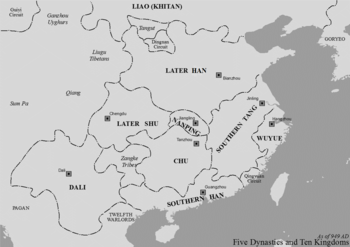Dingnan Jiedushi
Dingnan Jiedushi (simplified Chinese: 定难节度使; traditional Chinese: 定難節度使), also known as Xiasui Jiedushi (simplified Chinese: 夏绥节度使; traditional Chinese: 夏绥節度使), was a military post known as a jiedushi created in 787 by the Tang dynasty and lasted until the early Song dynasty when its rulers established the Western Xia. It was headquartered in modern Yulin, Shaanxi. Its rulers were of Tangut stock starting from Li Sigong (Tuoba Sigong), and they effectively ruled the circuit in de facto independence despite its nominal submission to the central Chinese dynasties. Attempts by the Later Tang and Song dynasty to dislodge the family from its rule of Dingnan Circuit were unsuccessful, and the region eventually became the independent dynasty of Western Xia.

Pre-de facto independent Dingnan Jiedushi
- Han Tan (韓潭) (787-798)
- Han Quanyi (韓全義) (798-805)
- Yang Huilin (楊惠琳) (805-806)
- Li Yuan (李願) (806-811)
- Zhang Xu (張煦) (811-813)
- Tian Jin (田縉) (813-819)
- Li Ting (李聽) (819-820)
- Li You (李祐) (820-824)
- Fu Liangbi (傅良弼) (824-828)
- Li Huan (李寰) (828-830)
- Dong Zhongzhi (董重質) (830-832)
- Li Changyan (李昌言) (832-836)
- Liu Yuan (劉源) (836-838)
- Li E (李愕) (844)
- Mi Ji (米暨) (844-846)
- Li Ye (李業) (847-849)
- Cui Mou (崔某) (849-851)
- Li Fu (李福) (851-854)
- Zheng Zhu (鄭助) (854-857)
- Tian Zaibin (田在賓) (857-862)
- Li Yanyuan (李宴元) (865-869)
- Hu Mou (胡某) (869-874)
- Li Xuanli (李玄禮) (874-879)
- Zhuge Shuang (諸葛爽) (880-881)
Rulers of Dingnan Circuit until Western Xia's founding
- Li Sigong (~881–~886)
- Li Sijian (~886–908)
- Li Yichang (908–909/910)
- Li Renfu (909/910–933)
- Li Yichao (933–935)
- Li Yixing (935–967)
- Li Kerui (967–978)
- Li Jiyun (978–980)
- Li Jipeng (also known as Zhao Baozhong) (980–982, 988–994)
- Li Jiqian (also known as Zhao Baoji) (998–1004)
- Li Deming (1004–1031)
- Li Yuanhao (1031–1038, declaration of independent Western Xia state)
References
- New Book of Tang, vol. 221, part 1.
- Old History of the Five Dynasties, vol. 132.
- New History of the Five Dynasties, vol. 40.
- History of Liao, vol. 115.
- History of Song, vols. 485, 486.
- History of Jin, vol. 134.